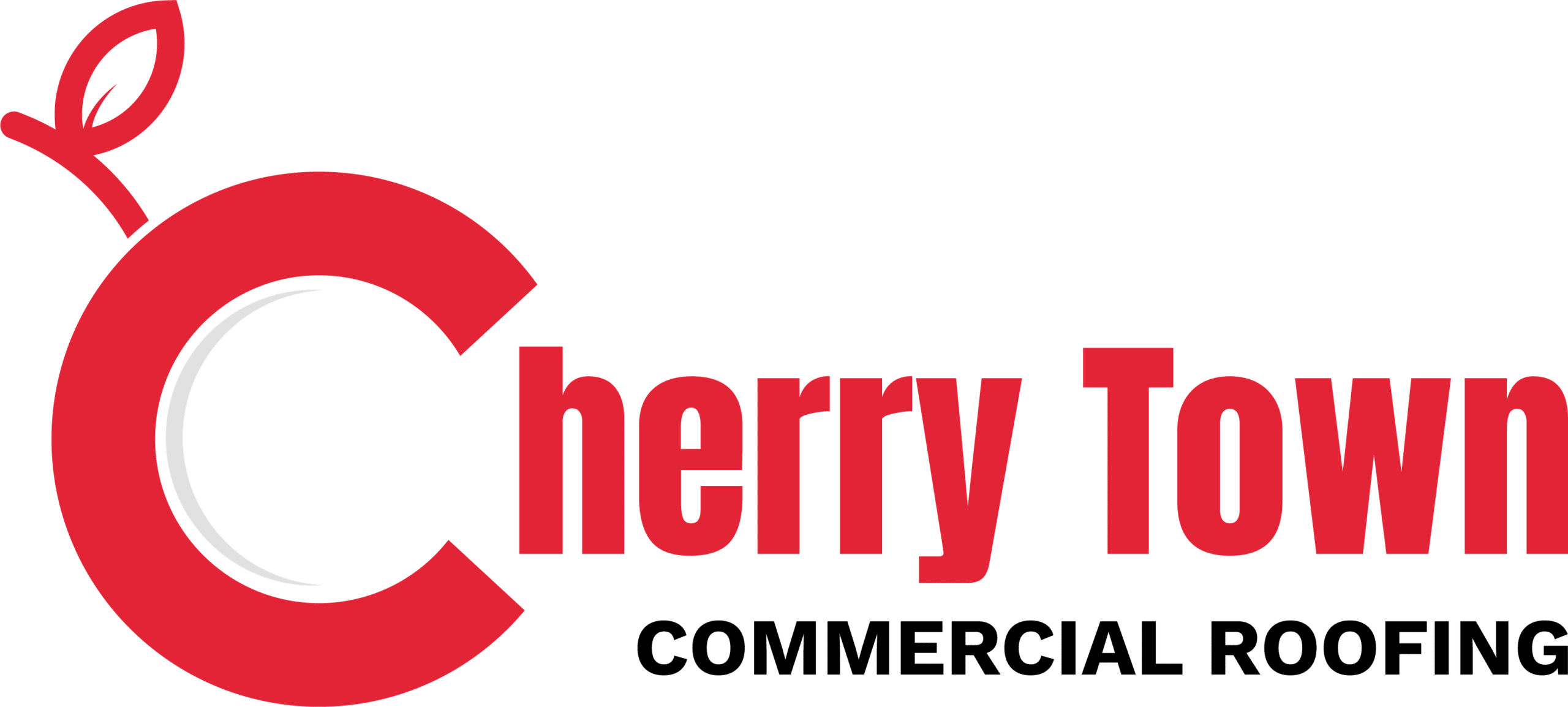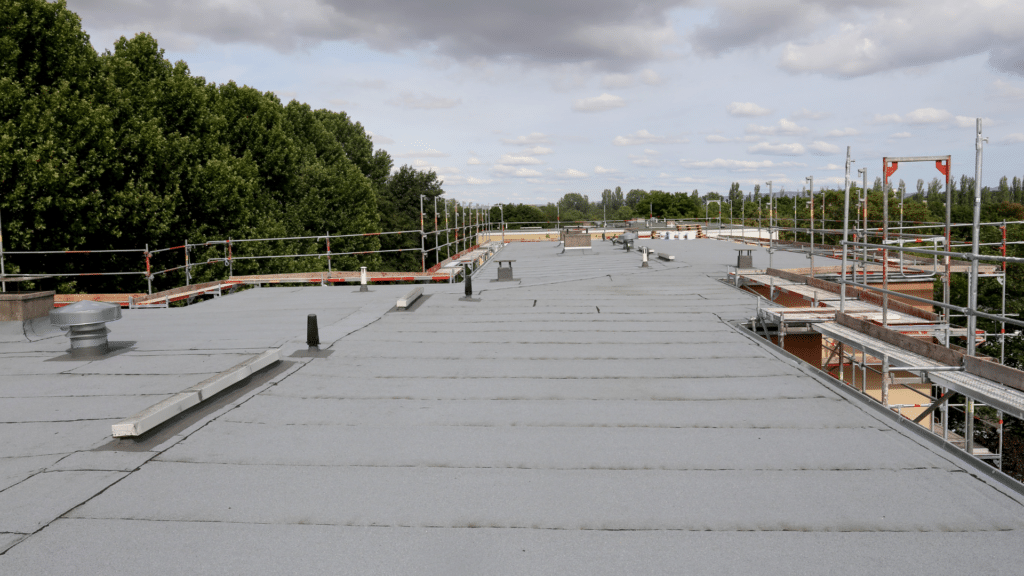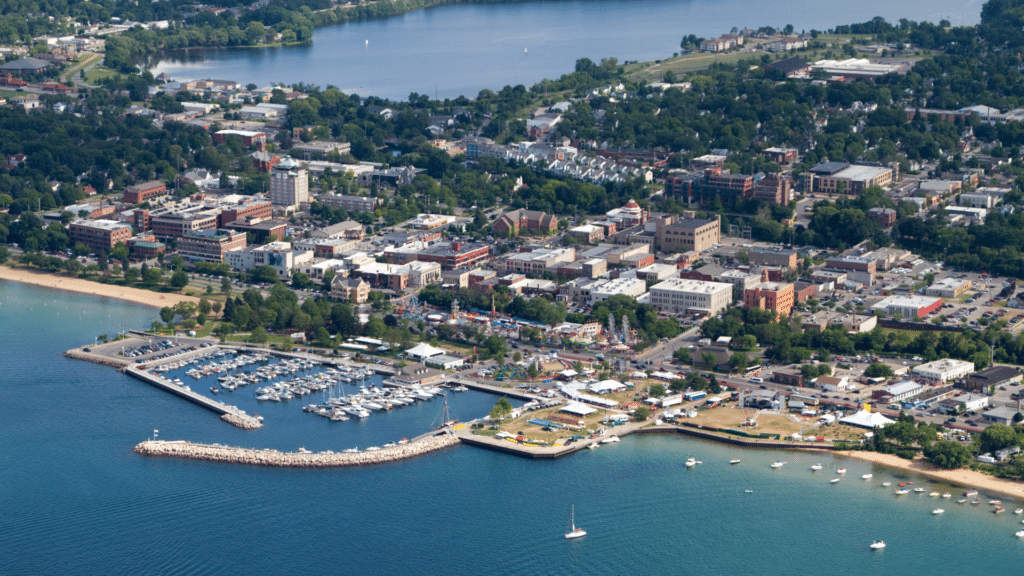Is It Time For A New Commercial Roof?
If you’re seeing signs like aging materials, frequent leaks, or declining energy efficiency, it may be time to replace your commercial roof. Cherry Town Commercial Roofing recommends regular inspections to catch issues early, helping you avoid costly repairs and reduce the risk of business disruptions. Stay proactive and ensure your building’s integrity with professional assessments.
Key Factors in Choosing a Commercial Flat Roof
When selecting a commercial flat roof, consider durability, energy efficiency, and cost. Cherry Town Commercial Roofing offers materials like EPDM, TPO, and PVC to meet different needs. Michigan’s harsh weather requires roofs that handle snow, rain, and UV exposure. Reflective materials improve energy efficiency, while proper drainage and ventilation prevent water buildup. By evaluating the building’s structure, HVAC system, and rooftop usage, Cherry Town Commercial Roofing ensures a roof that delivers long-term savings and reliability.

Importance of Roof Durability and Lifespan
Selecting a commercial flat roof requires prioritizing durability and lifespan to ensure long-term protection. Materials like EPDM or TPO offer longevity with low maintenance needs, ideal for Michigan’s weather conditions. Investing in a robust roof upfront can minimize costs in the long run by reducing repairs and maintenance, securing the investment in your commercial roofing system.
Weather Considerations in Michigan
Michigan’s weather presents challenges for commercial flat roofs with temperature fluctuations, heavy snowfall, and frequent rain. At Cherry Town Commercial Roofing, we recommend durable options like EPDM and TPO, known for their resistance to UV exposure, high winds, and extreme temperatures. Proper installation and regular inspections are key to ensuring your roof’s longevity in harsh conditions. Prioritizing effective drainage helps prevent water buildup, minimizing damage and maintenance costs. Choose weather-resistant materials and proactive maintenance to safeguard your investment in Michigan’s unpredictable climate.
Budget Constraints and Cost-Effectiveness
When evaluating commercial roofing options, consider budget constraints and cost-effectiveness. Commercial flat roofing materials vary in initial and long-term costs. EPDM and TPO roofing systems are known for affordability and low maintenance. Understanding installation complexity and maintenance costs is crucial for budget planning. Balancing upfront expenses with long-term savings through energy efficiency and durability is key. Proper maintenance, inspections, and choosing the right material can minimize overhead costs in the long run. Assess short-term expenses and long-term benefits when selecting a commercial flat roof option.
Types of Commercial Flat Roofs Available
EPDM roofing is essential for commercial buildings due to its durability and weather resistance. Known for low maintenance requirements, EPDM (ethylene propylene diene monomer) is a popular choice. TPO (thermoplastic polyolefin) offers energy efficiency, while PVC membranes provide fire resistance and UV ray reflection. Green roofs are eco-friendly and offer insulation and space utilization, while metal roofing is durable in extreme weather. Choose EPDM for longevity, TPO for energy efficiency, PVC for fire resistance, green roofs for eco-friendliness, and metal roofing for durability based on your building’s needs and location.
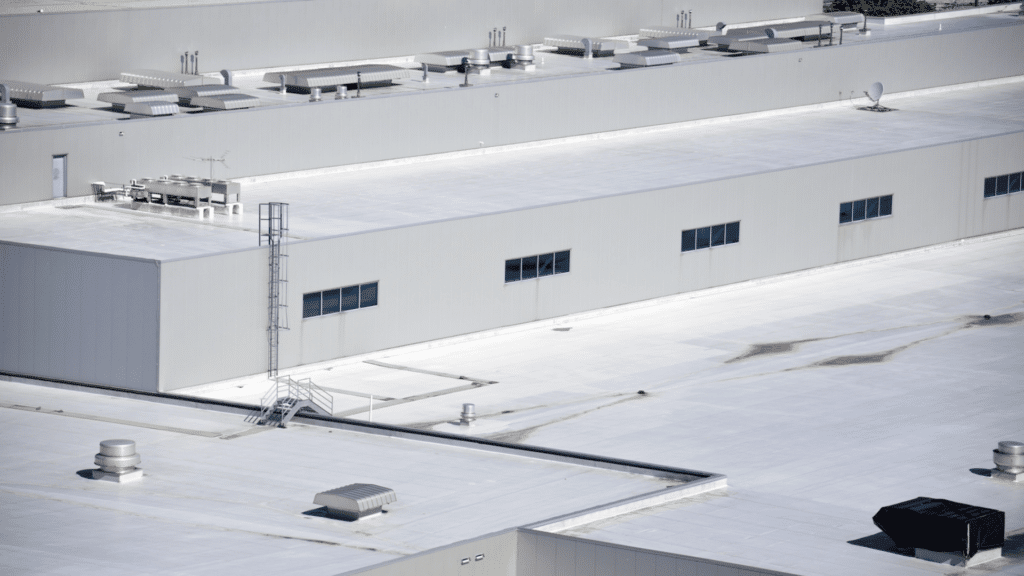
Overview of EPDM Roofing Systems
EPDM roofing, or ethylene propylene diene monomer, is a durable and energy-efficient choice for commercial flat roofs. These synthetic rubber membranes protect against UV rays and harsh weather, making them perfect for industrial buildings in Michigan. With low maintenance needs, EPDM roofs save on upkeep costs. Depending on the building’s size and structure, installation complexity varies. Regular maintenance ensures these roofs last for decades, offering a cost-effective solution for businesses seeking reliability and longevity in their flat roof option.
Benefits of TPO Roofing for Businesses
TPO roofing, or thermoplastic polyolefin, is a top choice for commercial flat roofs in Michigan. It offers energy efficiency, low maintenance, and protection against harsh weather. The installation is simple compared to other systems, reducing costs for property owners. TPO roofs are reflective, cutting down on utility bills. Durable and cost-effective, TPO roofing is a smart investment for businesses looking for long-lasting solutions.
Understanding PVC Roofing Options
PVC roofing is popular in commercial flat roofing for its durability and energy efficiency. With low maintenance needs and UV protection, PVC membranes offer advantages to building owners. Installation involves synthetic materials for fire resistance and water drainage. PVC roofs can support rooftop gardens or solar panels, utilizing overhead space efficiently. This sustainable option reduces utility bills and maintenance costs over time, making it a reliable choice for commercial roofing.
The Role of Modified Bitumen in Commercial Roofing
Modified bitumen plays a crucial role in commercial roofing due to its resilience and adaptability to various climates. This type of commercial flat roofing material consists of asphalt and a polymer blend, enhancing its durability. It is a popular choice for industrial buildings, offering excellent protection against harsh weather conditions. The installation process of modified bitumen can vary in complexity, and proper installation techniques ensure its longevity. Its fire-resistant properties make it a reliable option for commercial flat roofing, providing building owners with peace of mind. With low maintenance requirements and long-term durability, modified bitumen proves to be a cost-effective solution for commercial roofs.
Exploring Built-Up Roofing (BUR) Solutions
- Built-Up Roofing (BUR) is a classic option for commercial roofing.
- It has many layers of roofing felts and bitumen.
- This type of roof offers great protection from bad weather and is fire-resistant.
- BUR systems require little maintenance and last a long time.
- This makes them a popular choice for industrial buildings.
- Installing a BUR system means stacking the materials carefully.
- This creates a strong and long-lasting roof deck.
- Property owners value the cost-effectiveness and reliability of BUR solutions.
- They ensure that commercial flat roofs are secure and durable.
Maintenance and Upkeep of Your Flat Roof
Regular maintenance is vital for commercial flat roofs to ensure longevity and performance. Conducting scheduled inspections helps detect issues early, preventing costly repairs. Addressing any water accumulation promptly is crucial to avoid structural damage. Proper drainage systems and ventilation help maintain the roof’s integrity. Handling weather damage promptly extends the roof’s lifespan. Implementing long-term care strategies, such as periodic cleaning and repairs, is essential. By staying proactive with maintenance, property owners can minimize maintenance costs and maximize the roof’s efficiency.
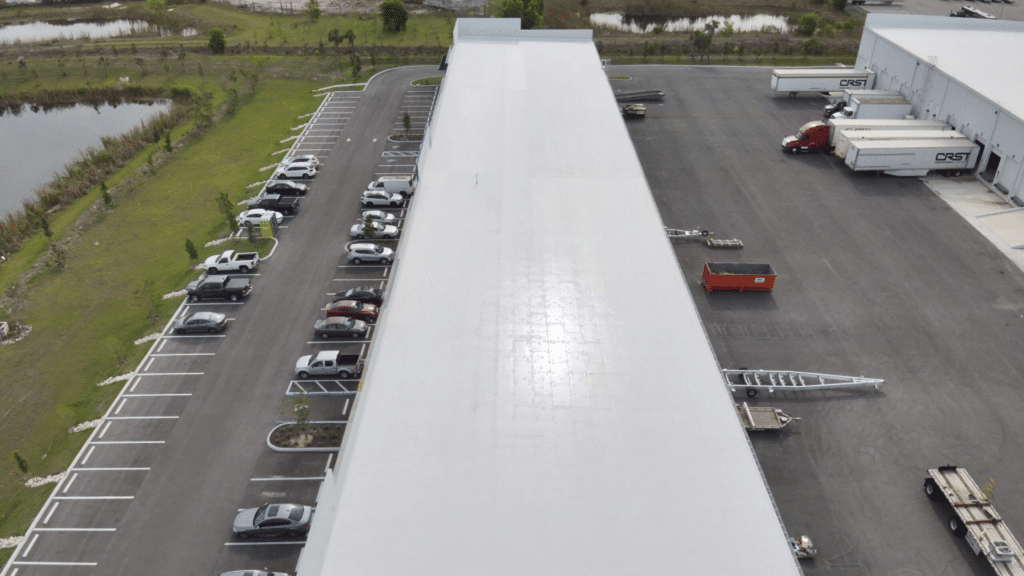
Regular Maintenance Tasks and Schedules
Regular maintenance of commercial flat roofing is crucial for longevity and performance. Scheduled inspections, typically twice a year, help identify issues early. Tasks include clearing debris, checking for water accumulation, and ensuring proper drainage. Inspecting seals and seams is vital to prevent leaks. Regularly cleaning the roof surface maintains reflectivity, enhancing energy efficiency. Maintenance schedules should account for Michigan’s extreme weather conditions, requiring special attention to roof durability. Engaging professionals for maintenance ensures thorough upkeep and minimizes long-term costs. Implementing a proactive maintenance plan can extend the lifespan of your commercial flat roof significantly.
Dealing with Weather Damage and Repairs
Weather damage on commercial flat roofing is a common challenge, especially in areas with extreme conditions like Michigan. Proper installation techniques and materials can mitigate risks, but repairs may still be necessary. Regular inspections are crucial to identify issues early. Water accumulation due to improper drainage can lead to costly repairs. Handling weather damage promptly is vital to prevent structural damage and maintain the roof’s integrity. Repairing leaks, addressing punctures, and ensuring the roof surface is intact are essential tasks. Property owners should prioritize repairs promptly to avoid escalating maintenance costs and protect their investment. Regular maintenance and swift repairs can extend the lifespan of a commercial flat roof.
Long-Term Care Tips for Extending Roof Life
Regular upkeep is crucial for extending the lifespan of your commercial flat roof. Implement a preventive maintenance plan to address minor issues before they escalate. Conduct routine inspections to catch any damage early on. Ensure proper drainage to prevent water accumulation, which can lead to leaks and structural damage. Invest in regular professional maintenance to keep your roof in optimal condition. Consider incorporating energy-efficient and reflective materials to enhance longevity. Implement proper ventilation systems to prevent moisture buildup, which can deteriorate the roof surface. By prioritizing maintenance and addressing issues promptly, you can significantly extend the life of your commercial flat roof.
Contact Cherry Town Commercial Roofing for Expert Flat Roof Solutions
Selecting the best flat roof for your business requires careful consideration of factors like durability, weather conditions, budget, and maintenance needs. Understanding the various flat roofing options and their benefits is crucial for making an informed decision. At Cherry Town Commercial Roofing, we emphasize the importance of proper installation and regular maintenance to maximize your roof’s lifespan. Energy efficiency and environmental impact should also play a role in your choice. Additionally, being mindful of warranties and insurance can protect your investment in the long run. If you need assistance selecting the right commercial flat roof for your Michigan business, contact us today.
Frequently Asked Questions
What is the Best Commercial Flat Roof Material for Michigan Weather?
For the tough weather in Michigan, EPDM and TPO are great options for flat roofing. These materials are strong and last a long time. They also help save energy and handle the extreme temperatures and heavy snow that Michigan often sees.
How Often Should Commercial Flat Roofs Be Inspected?
Regular inspections are very important for making your commercial roof last longer and reducing maintenance costs. You should have a skilled professional check your roof at least two times a year. This helps find problems early and keeps things safe.
What are some important factors to consider when choosing a commercial flat roof?
When choosing a commercial flat roof, you should think about a few important things. First, consider your budget. Next, look at the weather conditions in your area. You should also think about how long you want the roofing material to last. Finally, check how much maintenance each type will need.
How does the location and climate impact the choice of a flat roof for commercial buildings?
Location and climate play a big role in choosing a flat roof for commercial buildings. Weather factors such as rain, snow, and temperature changes affect the best materials and drainage options that should be used.
